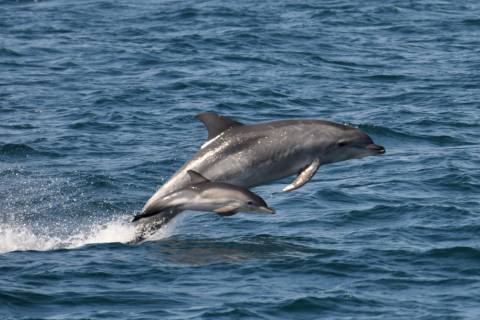13 Things You Didn’t Know About Dolphins

Everyone loves catching sight of dolphins in the wild when visiting the beach, but how much do you know about these magnificent creatures? As April 14 is National Dolphin Day, it seems like a good time to dive deep to learn more.
Dolphins are mammals, not animals, and are part of the cetacean family. They tend to be social and travel in groups. Whales and porpoises are also cetaceans, and killer whales are actually part of the dolphin family.
Dolphins communicate with squeaks, buzzes, whistlers, and slapping the water’s surface with their tails or bodies.
Dolphins are intelligent. They can recognize themselves in mirrors and use tools such as sponges to protect their beaks from harmful rocks on reefs. They can also turn off one-half of their brain when they sleep and keep one eye open to watch for predators.
Dolphins are fast. They can swim up to 34 miles per hour over short distances.
They stay with their mothers for about three years and sometimes up to eight.
Dolphins have two stomachs, one for storing food and one for digestion. They swallow their prey whole so that the spines of fish don’t catch in their throats.
Dolphins can dive up to 1,000 feet.
They live up to 50 years, though the average lifespan is about 17 years.
About 40 species of dolphins exist, some as small as 3-4 feet long and others that get up to 30 feet long. The most commonly seen in South Carolina waters is the bottlenose dolphin. Spotted dolphins and spinner dolphins also swim off the coast.
The Marine Mammal Protection Act makes it illegal to harass, feed, capture, swim with, or kill dolphins. Additional viewing guidelines require spectators to stay at least 50 yards from dolphins. Those operating watercraft are banned from chasing dolphins.
One of the main threats to bottlenose dolphins is getting caught in fishing gear, nets, trawls, and longlines. Dolphins can be injured when they accidentally take the bait, eat discarded fish, or are fed fish (which is illegal. If you see dolphins while fishing, reel in your line and wait for them to leave the area.
Harmful algal blooms such as red tide also result in several dolphin die-offs each year.
Dolphins can be found all over the world. There are even freshwater dolphins. But we are partial to the dolphin families found in South Carolina waters.
Catch sight of them with a dolphin cruise during your Hammock Coast stay. Book with Blue Wave Adventures out of Crazy Sista Marina or Express Water Sports, which has a private dock in Murrells Inlet.
